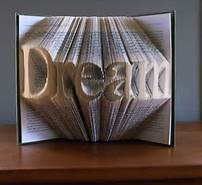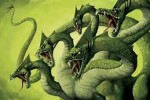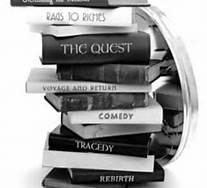Have you, like me, always heard there are only 7 stories in literature? Here’s the list I was given a long time ago – and I don’t know where it originated:
- Love
- Money
- Power
- Revenge
- Survival
- Glory
- Self-Awareness
Christopher Booker’s The Seven Basic Plots gives us 700 pages of detailed explanation of a different set of plots:
It seems to me that Booker’s are more specific. And notably missing in Booker’s list is love or romance. He says that love is a side note to all of these (yet the Romance novel is the top genre in sales). His reasoning is that romance weaves, or can weave, its way through all of the plots he lists, so it is not really a plot in its own standing. The same with some of the other things in the original list. Others say just the reverse – that they can weave any story through a plot of Love or some other designation. Is this a standoff?
When you start a novel or even a short story, are you conscious of these seven story lines? Do you have, in your mind, a definition of how you would categorize the tale?
I must be a backwards writer. I just start telling a story. If someone asks me “What is your story about?” I have trouble answering. It’s not until I have all the subtle nuances set up and figured out that I truly know the purpose of the tale. Sometimes, I have to wait until the story tells ME what it’s about.
It also seems to me that the best stories are the combos. A simple romance or who-dunnit is not enough. Jack discovered someone stole his grandfather’s watch, figured out who was on duty, and confronted the thief – who confessed. Ho-Hum. I want a few extra plot twists and turns in the story. I want him to murder the suspect and then find out it was the wrong guy, so he has to face the music. Or to blackmail the thief for more money than the watch was worth, but the thief has to pay in order to save his reputation, so he tries to murder Jack to silence him, and then….
So how do you define a story that is about love and revenge? Or money and power (often hand in hand…is there something to that?) How about those that take an about-face – like the revenge story that suddenly has the character face to face with his/her own fallacies ? Which is it – revenge or self-awareness?
What is Alice’s Adventures in Wonderland truly about? There is Comedy, Quest, Overcoming the Monster, and Voyage and Return woven into it. Did Alice coincidentally learn her capabilities?  Was it by chance that she began to see the truth of the other characters’ personalities – or do you think Carroll planned it all along? If so, which of the seven categories would be applied?
Was it by chance that she began to see the truth of the other characters’ personalities – or do you think Carroll planned it all along? If so, which of the seven categories would be applied?
Are these still the same seven, or have we created a ‘plot-hydra’ – cutting off one and having two spring up in its place?
The plot thickens, doesn’t it?
How do you define YOUR work? DO you define it before or after it’s written, or somewhere during the process?
(I know this post asks more questions than it gives answers. Just want you to know the kind of things that are puzzling me these days!)







I struggle with the same concept. I took a class recently and was introduced to the idea that readers want to learn something about themselves in books and stories. I don’t know that I believe that but a good friend told me the same thing. I am not sure I am up to that challenge. I don’t choose books to learn about myself, in particular, unless there is something specific I need to know, and then it isn’t fiction I need. I suppose there is some vague self awareness in the stories I read as I compare the behavior of the characters to how I think I may have acted instead, but it isn’t necessarily why I read fiction. I like both of the lists you posted and it gives me something to use as a guideline.
Hi Gayle,
Thanks for the friend request and it was very timely because I enjoyed this post and shared it. I’ve always admired writers who outlined their plots and knew everything that would happen before they started writing. But I’m like you, I just start writing not really knowing where I’m going. It’s really more of an adventure that way, I find. Of course, sometimes things don’t work out or I write myself into a corner, but I have a lot of fun because it’s a journey of discovery, and when it does work out, it’s magical. Ron
Hi, Ron! Welcome to our circle. You are so right about the discovery part!
For me, stories arise that need to be told, especially at this stage of the game. But I agrees that introducing twists, surprises and compelling characters is what makes good stories memorable. Good post.
Gayle, I found this to be a very interesting blog. Makes me think about my writing in a way I usually wouldn’t. I have a basic idea in mind of what my plot would be categorized as I write it. Sometimes I stray from the idea but knowing what I want it to be can bring my storyline back to where I intend for it to be. Sort of a mental outline I guess. Not to say that I can’t have other plot/storylines in there, but I usually know which one I want to be the mover of the story. Thanks for keeping us on our toes…keep up the great blogs.
Sandra, yours is a method I would like to be able to take. It seems to me it would help move the story along, and reduce the dead-ends that I run into along the way. I just haven’t gotten there yet. Thanks for the comments!
Same as you, Gayle, I just tell the story. Often have a hard time defining genre other than “mainstream.”